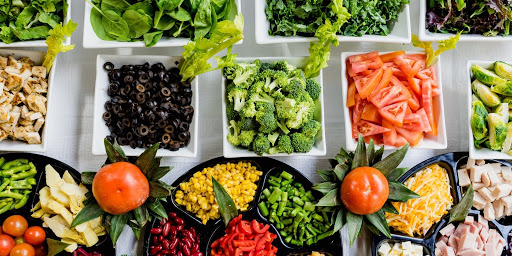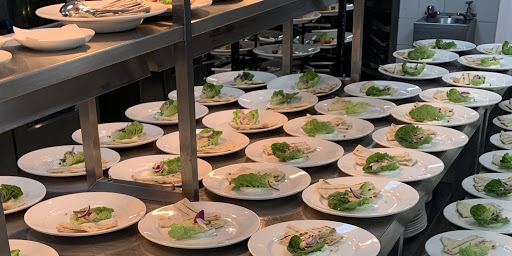
Many elements go into making an event successful, the food is crucial to boost your delegates energy and drive for full event engagement. Food is the fuel we all need to help us function, learn and make decisions, so it makes sense that the right food fits the right occasion. Here are our top 6 tips on how to choose the right food for your event.
Are you considering including break and mealtimes as part of your overall agenda? Are you looking for your delegates to network during meal times, do you want to have facilitated table discussions, are there topics you would like informally discussed or is it a chance to catch up with colleagues and friends? Will you be producing table plans in advance, moving delegates around during courses or free seating. Working with your event planner to help understand your vision and thinking will open up discussions with your selected venue looking at available spaces, menus and how you can create the right environment to maximise these times.
Zest advises that when sending out invitations, delegates are given the opportunity to notify us of any food allergies or dietary requirements. Giving tick box options is a great way to pick up most dietary requirements, however, also add in a free type box for those with multiple requests.
As organisers, you like to ensure all of your guests are accommodated. With so many personal preferences or dietary program being followed, your event planner can work on your behalf with venues and their chefs to come up with suitable menus and any necessary adaptations.
Even if guests have not made specific requests, it is often more advantageous that catering, whether for a meeting, coffee break or dinner, should have multiple options to accommodate personal preferences. Buffets are a great way of giving your delegates choice and with careful menu planning, you can accommodate all of the dietary requests. Venues will assist with food labelling.
Once you have your vision, your event planner can work with you and your venue to look at the catering options available. Make sure there is variety, choice and that the food reflects the audience and the event. If the event is over a few days make sure you mix it up with different menus and locations. Good venues will be flexible and want to work with you, talk to your event planner who can handle these negotiations on your behalf. You may find there are supplements or additional charges for different menus so watch out for those. Menus will need to be agreed in advance along with final numbers, make sure you have collated your delegates dietary requirements well in advance to ensure the venue has time to make any necessary adjustments.
During your event planning meetings with the venue, talk through each of the meals. Once the menu has been agreed understand how the service works; standing or seated, buffet or plated, what is the anticipated speed of service, what are the staff to guest ratios, are there any speeches, presentations or entertainment to consider. This is crucial for the chef’s timings. Suddenly having to wait an extra 45 minutes to serve a starter due to unscheduled speech can sometimes mean the food is overcooked or cold.
Have all the dietary requirements been accounted for? Will each dish be labelled with all the relevant ingredients? How do they ensure there is no cross-contamination in the kitchen? Will the staff understand and be knowledgeable about the need to keep foods separate? Depending on the information the delegates provided about food restrictions, some of this information will be vitally important. Event planners often break down this down into 3 categories: allergens/intolerances, dietary requests, and religious requests and work with the venue in detail to accommodate each guest.

Today people are imposing a variety of dietary requirements on themselves and others for health, religious or lifestyle reasons. For many years’ venues have accommodated vegetarian diets however today they must consider vegan, pescatarian, ketogenic or Paleo diets.
Delegates may also have diabetes or celiac disease, which requires them to be gluten-free. And others require Kosher or Halal diets in line with religious beliefs.
Great venues are compliant with food regulations. Event planners will double check and brief venue catering teams in advance of any allergies among your group. An allergic reaction can leave delegates with anything from hives through to difficulty breathing. It is important therefore to ensure teams are well educated on the rules and can therefore confidently answer any questions they are asked. Some venues do not display basic nutritional information on menus so this makes it all the more important that organisers are aware.

If a delegate’s requirements are complicated it is often a good idea for them to speak with the event planner who can make the arrangements on their behalf with the venue. It is essential that the organiser is kept in the loop as they have ultimate responsibility for the wellbeing of their guests.
On the day of the event, all delegates should have the same experience ie those with different dietary needs must not feel uncomfortable or embarrassed. It is the job of the venue and those organising the event to ensure that they find a subtle way to communicate who should receive which meal.
Finally, in today’s society, there is a big push for healthy eating and the positive effects it has on concentration, performance and mood. There are a handful of venues who are starting to introduce this into their menus. However, for the majority, there is still a way to go. If wellness and healthy and balanced eating is important to your event, select the venue which can work with you to deliver this type of food. If you are restricted by which venue you can use, work with the venue to ensure that there are lots of healthy options available including the use of fresh produce, vegetables, fruit, whole grain options of rice, pasta and bread where ever possible. Mix up breaktimes with smoothies, raw juice shots or even beetroot brownies!
If, for any reason, you are unable to serve healthy alternatives, it’s a great idea for you to build in exercise time, from walk the grounds to using the venues gym facilities.
As event planners, here at Zest Global Events, we love working with venues and hotels to come up with exciting and interesting menus and dining experiences. We love working with venues who are proactive, helpful and open to working with event planners and clients to bring their vision to life!
Please do get in touch with us if you would like advice or help on planning your next event.
© Copyright 2024 Website built by Boson Media